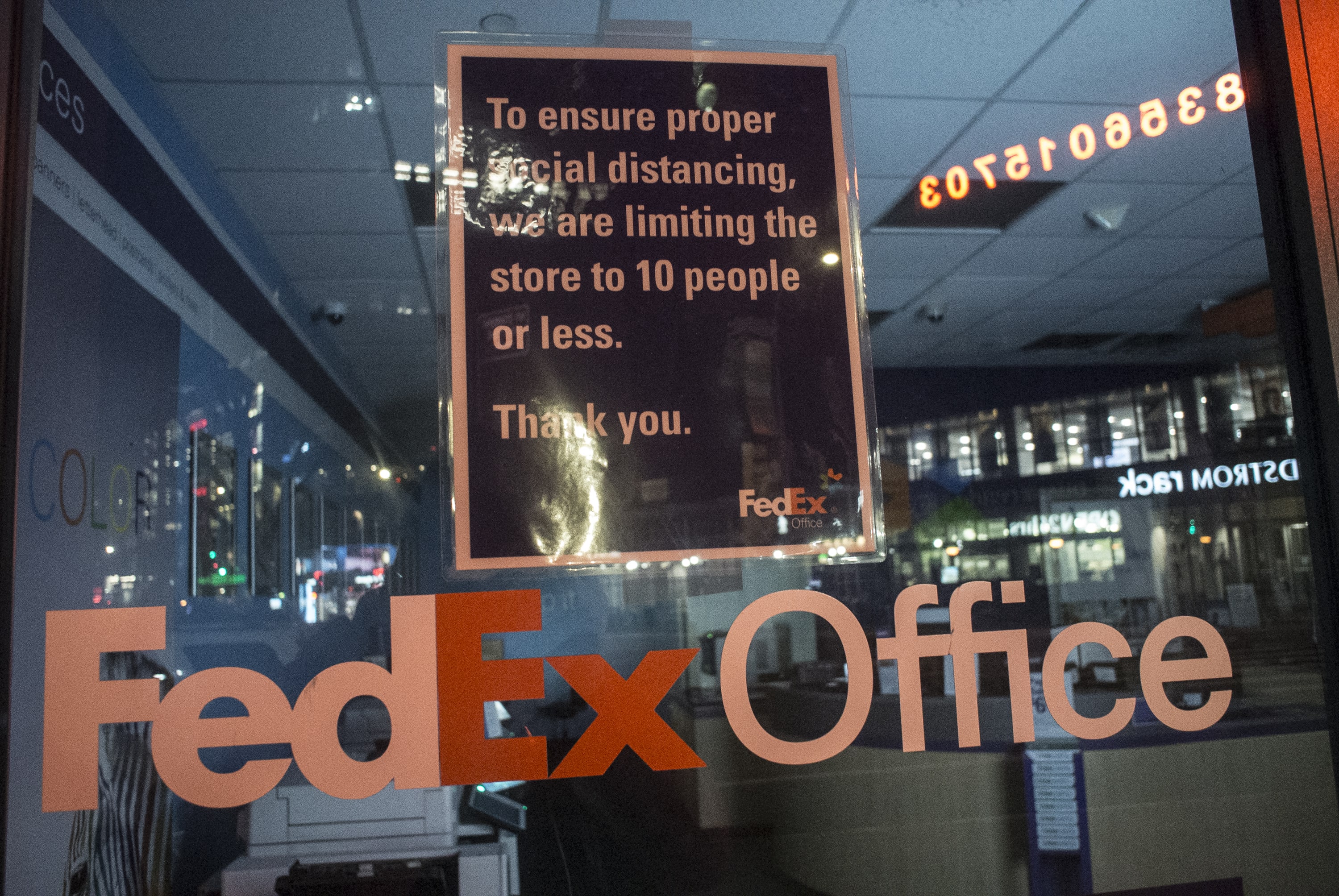
Fed Ex change of hours and Social Distancing signage due to the COVID-19 coronavirus pandemic on March 22, 2020 in New York City.
Bill Tompkins | Getty Images
FedEx, citing the devastating impact of Covid-19, requested that its rent be cut in half at some FedEx Office locations for three months, a move sharply criticized by one landlord.
“This unprecedented crisis impacted our business in March and will continue to do so in the coming months,” Ari Spitzer, FedEx’s vice president of real estate, said in the April 13 letter obtained by CNBC.
“As an essential business, we enable the movement of so many critical supplies, including medicine and medical supplies, commerce, and at a time when so many other businesses are closed or closing, we have continued to operate to keep fulfilling our mission. We write now to request your assistance.”
The rent reduction would cover June 1 to Aug. 31. The company said it has continued to operate about 2,000 FedEx Office stores “as an essential business, supporting urgent printing and shipping needs for our customers.”
In a statement to CNBC, the company said, “Due to the economic impact of Covid-19, FedEx Office has implemented a number of temporary measures to protect the financial stability of the company for the long-term benefit of our workforce, customers and shareholders. While we can’t go into specifics, these measures are intended to align our cost structure with current operational and business requirements.”
The company declined to comment on how many landlords received a rent reduction request and said it would not respond beyond the statement.
The request outraged Paul Orfalea, who is a landlord for nine FedEx locations in seven states across the country. The facilities, which are in strip malls and stand-alone buildings, are rented by partnerships in which Orfalea has a stake. He said so far he has received rent reduction letters for five FedEx locations.
Orfalea, a philanthropist and public speaker who teaches at USC and Loyola Marymount, founded Kinko’s in 1970. The printing services store grew into more than 1,000 stores around the world and nearly $2 billion in annual sales. Orfalea stepped aside as chairman and left the board in 2000, prior to FedEx acquiring the business in 2004.
Paul Orfalea, founder of Kinko’s.
E. Charbonneau | Getty Images
“If you are doing well financially, they should be paying their rent,” Orfalea said. “They are taking advantage of the situation.”
He said he has given rent breaks to smaller businesses that are closed but sees no reason why FedEx should get a break.
“Their business is good … They are hiring people and then they want to chisel with the landlord?” he said. “I can understand so many people are suffering right now and not paying their rent. But FedEx, when they are making money and open for business, I don’t understand it.”
FedEx declined to comment on the criticism. Orfalea said he wants to keep FedEx as a tenant.
In a letter responding the company’s rent reduction request, Orfalea’s partnership said, “It appears you have plenty of cash available in your corporate coffers for your expenses and business operations.”
“We value FedEx and appreciate our long-standing relationship; however we do not see why we should have to subsidize your operations with our cash and you have not given us any reasons why we should do so.”
FedEx shares have fallen 14% since the start of the year. Like many companies, FedEx has taken a number of steps to shore up its reserves during the pandemic. In early April, the company said it was slashing CEO Frederick Smith’s base salary and drawing down $1.5 billion from a credit facility. It also announced plans to tap debt markets.
In addition to disruptions from the coronavirus pandemic, FedEx has had difficulty integrating its acquisition of TNT Express and has lost Amazon.com as a customer.
For the quarter ended Feb. 29, FedEx earnings fell to $371 million, or $1.41 per share, on revenue of $17.5 billion.
Please email tips to investigations@cnbc.com.
Leave a Reply